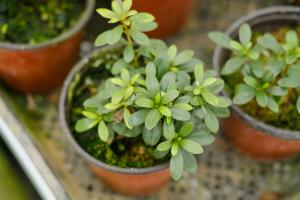Where to Plant My Japanese Maple Tree
Japanese Maple tree is a highly sought-after tree for its wonderful shape, beautiful foliage, and impressive range of colors. If you are planning to grow a Japanese Maple tree in your garden, you need to consider various factors to ensure its healthy growth and long-term survival. One of the most important factors is selecting the right location for your tree. In this article, we will explore some essential considerations for planting your Japanese Maple tree.
Site Selection
The first step in planting your Japanese Maple tree is to select a suitable site. Japanese Maple trees thrive in deep, well-drained soil that has plenty of organic matter. The tree prefers acidic soil, with a pH of 5.5 to 6.5. It does not tolerate drought and prefers a humid environment.
Choose a site where the tree can get sufficient sunlight, but not too much direct sunlight. Japanese Maple trees are susceptible to sunscald, and the leaves may wilt and scorch if exposed to direct sunlight for extended periods.
The tree also does not do well in windy areas or where there is a lot of foot traffic. Ensure that the site is sheltered from strong winds and is located away from areas where people and pets regularly walk.
Planting Instructions
Once you have selected the right site, it's time to plant your Japanese Maple tree. Here are some planting tips:
1. Dig a hole that is twice as wide as the root ball and slightly less deep. The hole should be deep enough to accommodate the root ball, but not so deep that the root flare is below the soil surface.
2. Gently remove the tree from its container and examine the roots. If the roots are tightly coiled, gently loosen them to encourage them to spread out. If the tree has been bare-rooted, soak the roots in water for a few hours before planting.
3. Place the tree in the hole and backfill with soil. Ensure that the tree is planted upright, and the root flare is at or slightly above ground level.
4. Water the tree thoroughly to settle the soil and remove any air pockets. Use a mulch around the base of the tree to conserve moisture and prevent weed growth.
Tree Care
Once your Japanese Maple tree is planted, it's important to provide proper care to ensure its health and longevity. Here are some care tips:
1. Water your tree regularly, especially during hot, dry spells. The soil should be moist, but not waterlogged.
2. Fertilize the tree once a year in spring. Use a slow-release, high-nitrogen fertilizer to encourage healthy growth and foliage.
3. Prune your Japanese Maple tree in late winter or early spring, before new growth begins. Remove any dead or damaged branches and thin out any crowded or crossing branches to maintain the tree's shape and structure.
Conclusion
Planting a Japanese Maple tree is a great way to add beauty and color to your garden. With proper site selection and care, your tree will thrive and provide you with years of enjoyment. Follow the instructions outlined in this article to plant and care for your Japanese Maple tree successfully.

 how many times do yo...
how many times do yo... how many planted tre...
how many planted tre... how many pine trees ...
how many pine trees ... how many pecan trees...
how many pecan trees... how many plants comp...
how many plants comp... how many plants can ...
how many plants can ... how many plants and ...
how many plants and ... how many pepper plan...
how many pepper plan...































